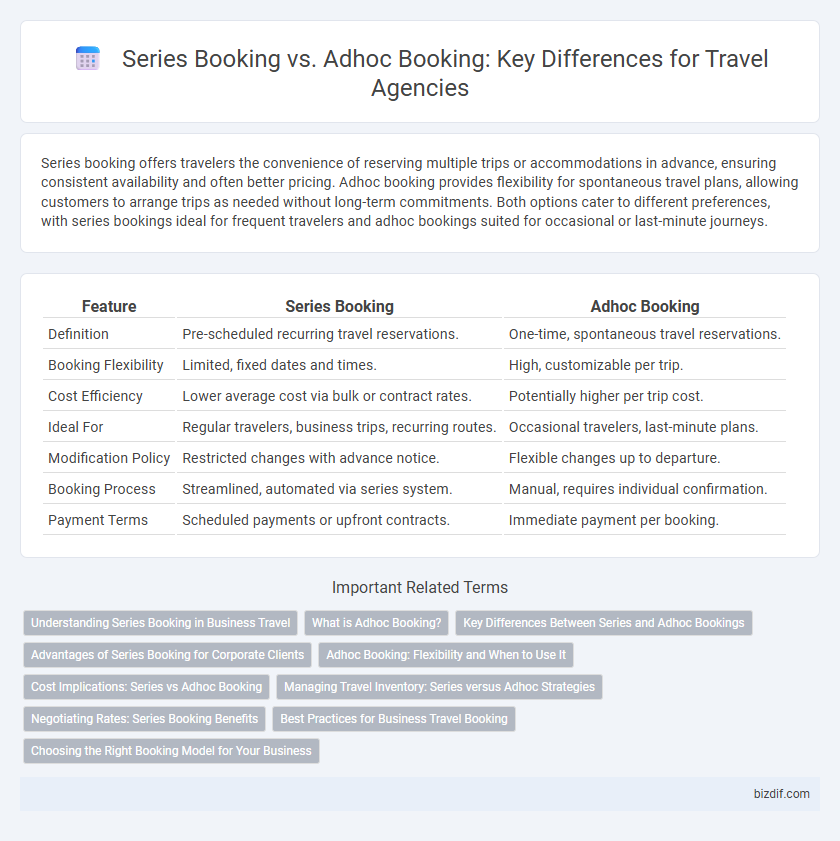Series booking offers travelers the convenience of reserving multiple trips or accommodations in advance, ensuring consistent availability and often better pricing. Adhoc booking provides flexibility for spontaneous travel plans, allowing customers to arrange trips as needed without long-term commitments. Both options cater to different preferences, with series bookings ideal for frequent travelers and adhoc bookings suited for occasional or last-minute journeys.
Table of Comparison
| Feature | Series Booking | Adhoc Booking |
|---|---|---|
| Definition | Pre-scheduled recurring travel reservations. | One-time, spontaneous travel reservations. |
| Booking Flexibility | Limited, fixed dates and times. | High, customizable per trip. |
| Cost Efficiency | Lower average cost via bulk or contract rates. | Potentially higher per trip cost. |
| Ideal For | Regular travelers, business trips, recurring routes. | Occasional travelers, last-minute plans. |
| Modification Policy | Restricted changes with advance notice. | Flexible changes up to departure. |
| Booking Process | Streamlined, automated via series system. | Manual, requires individual confirmation. |
| Payment Terms | Scheduled payments or upfront contracts. | Immediate payment per booking. |
Understanding Series Booking in Business Travel
Series booking in business travel involves reserving multiple trips or flights under a single booking reference, streamlining management and improving cost efficiency. This method provides predictable scheduling for frequent travelers, allowing companies to secure better rates and maintain consistent travel itineraries. Compared to adhoc booking, which is made for individual, one-time trips, series booking reduces administrative workload and enhances overall travel policy compliance.
What is Adhoc Booking?
Adhoc booking refers to reservations made spontaneously without a fixed schedule or recurring pattern, typically catering to last-minute travel plans or unique trip requirements. This type of booking offers flexibility for travelers who prefer spontaneous adventures or have unpredictable travel needs, contrasting with series booking that involves recurring, pre-planned trips. Travel agencies optimize adhoc bookings by providing customizable options and real-time availability to accommodate immediate travel demands.
Key Differences Between Series and Adhoc Bookings
Series bookings involve reserving multiple travel services or accommodations consecutively under a unified itinerary, ensuring consistency and often benefiting from discounted rates or simplified management. Adhoc bookings are individual, spontaneous reservations made separately without a linked itinerary, providing flexibility but potentially higher costs and increased administrative effort. Key differences include the level of coordination, cost-effectiveness, and the convenience of managing travel plans.
Advantages of Series Booking for Corporate Clients
Series booking offers corporate clients consistent travel arrangements with guaranteed availability, ensuring smooth scheduling for frequent business trips. This method often provides cost savings through negotiated bulk rates and flexible payment terms tailored to corporate budgets. Enhanced reporting and consolidated invoicing streamline expense management, improving overall travel efficiency for companies.
Adhoc Booking: Flexibility and When to Use It
Adhoc booking offers unparalleled flexibility for travelers who prefer spontaneity or have uncertain schedules, allowing reservations to be made individually as needed rather than in a fixed sequence. This type of booking is ideal for last-minute trips, business travel, or when travel plans are subject to change, providing opportunities to adjust dates and destinations without long-term commitment. Travel agencies can meet customer demands effectively by offering adhoc options, catering to dynamic travel needs with customizable and immediate booking solutions.
Cost Implications: Series vs Adhoc Booking
Series bookings typically offer lower per-trip costs due to negotiated bulk rates and contractual agreements, reducing overall expenses for frequent travelers. Adhoc bookings often incur higher prices, as they lack volume discounts and are subject to market fluctuations and availability. Travel agencies must weigh potential savings from series bookings against the flexibility that adhoc bookings provide.
Managing Travel Inventory: Series versus Adhoc Strategies
Managing travel inventory requires balancing series bookings, which secure multiple trips in advance under a single contract, and adhoc bookings, allowing flexibility for spontaneous travel needs. Series booking optimizes resource allocation by guaranteeing volume, reducing risks of overbooking or underutilization, while adhoc booking demands dynamic inventory adjustments to accommodate fluctuating demand patterns. Effective travel agencies integrate robust software systems to track and forecast series and adhoc bookings, enhancing operational efficiency and maximizing revenue streams.
Negotiating Rates: Series Booking Benefits
Series bookings secure consistent travel arrangements over multiple dates, enabling travel agencies to negotiate better rates with suppliers due to guaranteed volume. Suppliers often offer discounted pricing and flexible terms for bulk bookings, reducing overall costs and improving budget predictability. This strategic advantage enhances client satisfaction by ensuring availability and competitive pricing for recurring travel needs.
Best Practices for Business Travel Booking
Series booking streamlines business travel by locking in multiple trips under a single itinerary, reducing time spent on individual reservations and enabling volume discounts. Adhoc booking offers flexibility for spontaneous changes or one-off trips, ensuring adaptability to evolving business needs. Combining both methods optimizes travel management, balancing cost-efficiency with agility.
Choosing the Right Booking Model for Your Business
Series booking allows travel agencies to secure multiple trips or accommodations in advance, ensuring stable revenue and streamlined logistics for recurring clients. Adhoc booking provides flexibility and caters to spontaneous travelers who prefer personalized, one-time arrangements without long-term commitments. Selecting the right booking model depends on client demand patterns, operational capacity, and the business's strategic goals for growth and customer retention.
Series Booking vs Adhoc Booking Infographic

 bizdif.com
bizdif.com